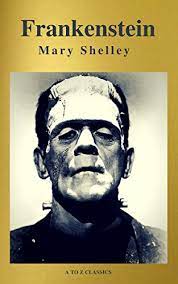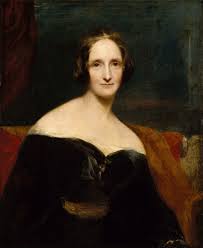Frankenstein Page #10
Frankenstein; or, The Modern Prometheus is an 1818 novel written by English author Mary Shelley. Frankenstein tells the story of Victor Frankenstein, a young scientist who creates a sapient creature in an unorthodox scientific experiment
Such were my reflections during the first two or three days of my residence at Ingolstadt, which were chiefly spent in becoming acquainted with the localities and the principal residents in my new abode. But as the ensuing week commenced, I thought of the information which M. Krempe had given me concerning the lectures. And although I could not consent to go and hear that little conceited fellow deliver sentences out of a pulpit, I recollected what he had said of M. Waldman, whom I had never seen, as he had hitherto been out of town. Partly from curiosity and partly from idleness, I went into the lecturing room, which M. Waldman entered shortly after. This professor was very unlike his colleague. He appeared about fifty years of age, but with an aspect expressive of the greatest benevolence; a few grey hairs covered his temples, but those at the back of his head were nearly black. His person was short but remarkably erect and his voice the sweetest I had ever heard. He began his lecture by a recapitulation of the history of chemistry and the various improvements made by different men of learning, pronouncing with fervour the names of the most distinguished discoverers. He then took a cursory view of the present state of the science and explained many of its elementary terms. After having made a few preparatory experiments, he concluded with a panegyric upon modern chemistry, the terms of which I shall never forget: “The ancient teachers of this science,” said he, “promised impossibilities and performed nothing. The modern masters promise very little; they know that metals cannot be transmuted and that the elixir of life is a chimera but these philosophers, whose hands seem only made to dabble in dirt, and their eyes to pore over the microscope or crucible, have indeed performed miracles. They penetrate into the recesses of nature and show how she works in her hiding-places. They ascend into the heavens; they have discovered how the blood circulates, and the nature of the air we breathe. They have acquired new and almost unlimited powers; they can command the thunders of heaven, mimic the earthquake, and even mock the invisible world with its own shadows.” Such were the professor’s words—rather let me say such the words of the fate—enounced to destroy me. As he went on I felt as if my soul were grappling with a palpable enemy; one by one the various keys were touched which formed the mechanism of my being; chord after chord was sounded, and soon my mind was filled with one thought, one conception, one purpose. So much has been done, exclaimed the soul of Frankenstein—more, far more, will I achieve; treading in the steps already marked, I will pioneer a new way, explore unknown powers, and unfold to the world the deepest mysteries of creation. I closed not my eyes that night. My internal being was in a state of insurrection and turmoil; I felt that order would thence arise, but I had no power to produce it. By degrees, after the morning’s dawn, sleep came. I awoke, and my yesternight’s thoughts were as a dream. There only remained a resolution to return to my ancient studies and to devote myself to a science for which I believed myself to possess a natural talent. On the same day I paid M. Waldman a visit. His manners in private were even more mild and attractive than in public, for there was a certain dignity in his mien during his lecture which in his own house was replaced by the greatest affability and kindness. I gave him pretty nearly the same account of my former pursuits as I had given to his fellow professor. He heard with attention the little narration concerning my studies and smiled at the names of Cornelius Agrippa and Paracelsus, but without the contempt that M. Krempe had exhibited. He said that “These were men to whose indefatigable zeal modern philosophers were indebted for most of the foundations of their knowledge. They had left to us, as an easier task, to give new names and arrange in connected classifications the facts which they in a great degree had been the instruments of bringing to light. The labours of men of genius, however erroneously directed, scarcely ever fail in ultimately turning to the solid advantage of mankind.” I listened to his statement, which was delivered without any presumption or affectation, and then added that his lecture had removed my prejudices against modern chemists; I expressed myself in measured terms, with the modesty and deference due from a youth to his instructor, without letting escape (inexperience in life would have made me ashamed) any of the enthusiasm which stimulated my intended labours. I requested his advice concerning the books I ought to procure. “I am happy,” said M. Waldman, “to have gained a disciple; and if your application equals your ability, I have no doubt of your success. Chemistry is that branch of natural philosophy in which the greatest improvements have been and may be made; it is on that account that I have made it my peculiar study; but at the same time, I have not neglected the other branches of science. A man would make but a very sorry chemist if he attended to that department of human knowledge alone. If your wish is to become really a man of science and not merely a petty experimentalist, I should advise you to apply to every branch of natural philosophy, including mathematics.” He then took me into his laboratory and explained to me the uses of his various machines, instructing me as to what I ought to procure and promising me the use of his own when I should have advanced far enough in the science not to derange their mechanism. He also gave me the list of books which I had requested, and I took my leave. Thus ended a day memorable to me; it decided my future destiny. Chapter 4 From this day natural philosophy, and particularly chemistry, in the most comprehensive sense of the term, became nearly my sole occupation. I read with ardour those works, so full of genius and discrimination, which modern inquirers have written on these subjects. I attended the lectures and cultivated the acquaintance of the men of science of the university, and I found even in M. Krempe a great deal of sound sense and real information, combined, it is true, with a repulsive physiognomy and manners, but not on that account the less valuable. In M. Waldman I found a true friend. His gentleness was never tinged by dogmatism, and his instructions were given with an air of frankness and good nature that banished every idea of pedantry. In a thousand ways he smoothed for me the path of knowledge and made the most abstruse inquiries clear and facile to my apprehension. My application was at first fluctuating and uncertain; it gained strength as I proceeded and soon became so ardent and eager that the stars often disappeared in the light of morning whilst I was yet engaged in my laboratory.
Translation
Translate and read this book in other languages:
Select another language:
- - Select -
- 简体中文 (Chinese - Simplified)
- 繁體中文 (Chinese - Traditional)
- Español (Spanish)
- Esperanto (Esperanto)
- 日本語 (Japanese)
- Português (Portuguese)
- Deutsch (German)
- العربية (Arabic)
- Français (French)
- Русский (Russian)
- ಕನ್ನಡ (Kannada)
- 한국어 (Korean)
- עברית (Hebrew)
- Gaeilge (Irish)
- Українська (Ukrainian)
- اردو (Urdu)
- Magyar (Hungarian)
- मानक हिन्दी (Hindi)
- Indonesia (Indonesian)
- Italiano (Italian)
- தமிழ் (Tamil)
- Türkçe (Turkish)
- తెలుగు (Telugu)
- ภาษาไทย (Thai)
- Tiếng Việt (Vietnamese)
- Čeština (Czech)
- Polski (Polish)
- Bahasa Indonesia (Indonesian)
- Românește (Romanian)
- Nederlands (Dutch)
- Ελληνικά (Greek)
- Latinum (Latin)
- Svenska (Swedish)
- Dansk (Danish)
- Suomi (Finnish)
- فارسی (Persian)
- ייִדיש (Yiddish)
- հայերեն (Armenian)
- Norsk (Norwegian)
- English (English)
Citation
Use the citation below to add this book to your bibliography:
Style:MLAChicagoAPA
"Frankenstein Books." Literature.com. STANDS4 LLC, 2025. Web. 22 Jan. 2025. <https://www.literature.com/book/frankenstein_1446>.




Discuss this Frankenstein book with the community:
Report Comment
We're doing our best to make sure our content is useful, accurate and safe.
If by any chance you spot an inappropriate comment while navigating through our website please use this form to let us know, and we'll take care of it shortly.
Attachment
You need to be logged in to favorite.
Log In